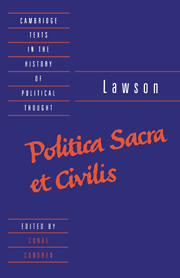Editor's introduction
Published online by Cambridge University Press: 05 June 2012
Summary
George Lawson's Politica sacra et civilis is a systematic treatise which traverses much of the conceptual terrain of seventeenth-century political discourse, and provides a critical accompaniment to many of the loudest catch-cries that echoed over it. Lawson's stated purpose is to facilitate a lasting civil and religious settlement. He conceives the church and the state as two broadly parallel and mutually informing structures of political, sovereign power and argues that an understanding of either requires an understanding of both. As Lawson provides an accessible synopsis of the volume in ‘The arguments of the several chapters’ (pp. 8–13), only the briefest outline of the work's theoretical structure is needed here.
Lawson begins by sketching in what he takes to be the nature of all forms of government under a supreme being, the very existence of whom is taken to limit all modes of human allegiance. From the outset, then, Lawson prefigures the central importance to him of authority and its limitations. In chapters two and three he introduces his notions of community and citizenship in civil and ecclesiological society respectively. Communities are divinely sanctioned, pre-political associations; they are comprised of citizens who, in a Ciceronian sense, are naturally free and equal fellows. A community of citizens, however, is not a mere aggregation of isolated individuals; it is a complex, incorporated society under natural law, whose full members represent the disfranchised. The community may lack nothing but the security afforded by the laws of a formal political hierarchy.
- Type
- Chapter
- Information
- Lawson: Politica sacra et civilis , pp. ix - xxviiiPublisher: Cambridge University PressPrint publication year: 1993



